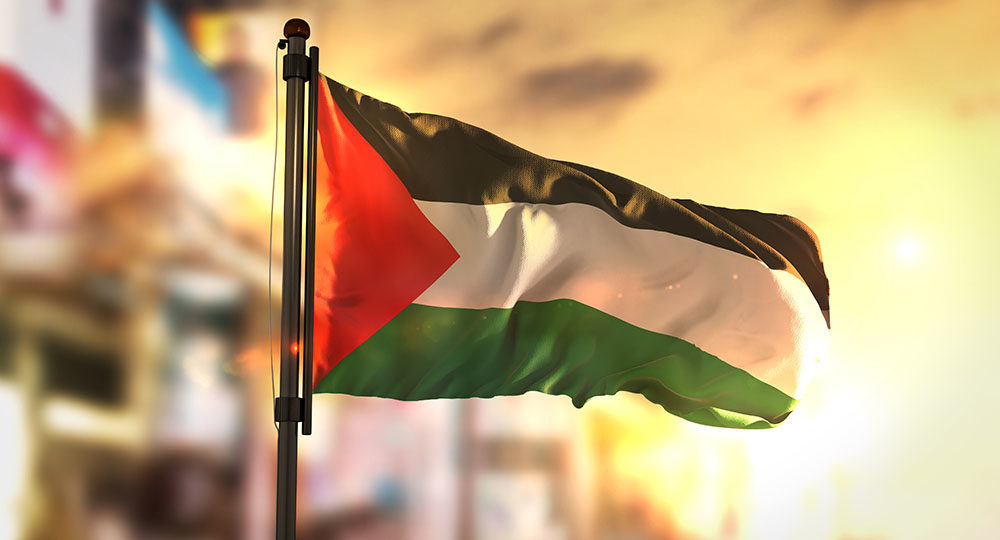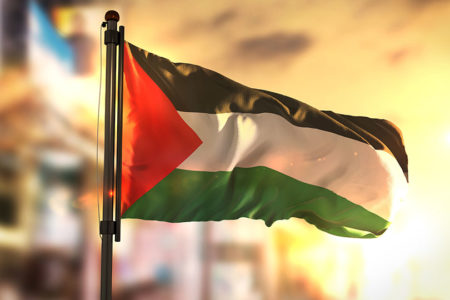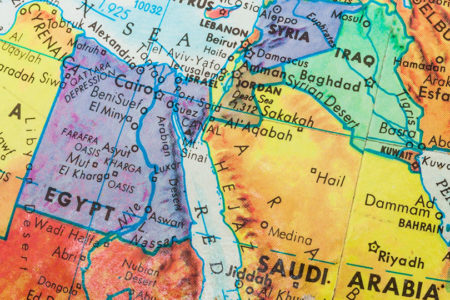A Palestinian State?
With a new Israeli prime minister who appears more open to negotiating with the Palestinians than his predecessor, it is appropriate to raise this question: What would a Palestinian state involve?
While the United States government has never publicly supported the establishment of a new country called Palestine in the Middle East, a statement by First Lady Hillary Clinton in May 1998 dramatically called attention to the issue. She told a gathering of Arab and Jewish youth, “I think it will be in the long-term interests of the Middle East for Palestine to be a state,” adding that statehood was important for the Palestinian people and for “the broader goal of peace in the Middle East.” Indeed, her action raised an important question: Will a Palestinian state serve the best interests of peace in the Middle East for all the countries involved, including Israel?
While many statements by Arab and world leaders assume a long-term Palestinian Arab attachment to “their land,” a few historical facts clearly raise doubts about this assumption. There has never been at any time in history a country in the Middle East called Palestine. In 135 A.D. the Romans, in order to punish the Jews for their recent war, changed the name of Judea to Palestine and made it part of the larger province they called Syria. This act was an effort to eliminate all connection between the Jewish people and their ancient homeland. The name Palestine was actually the Latin word Palestina for “Philistine.” This name recalled the ancient coastal “sea peoples” who had harassed the Israelites so much in the Books of Judges and 1 and 2 Samuel.
Even after the Arab conquest of the Middle East, no ruler ever allowed “Palestine” to be an independent country. The Arabs who lived there were simply considered part of the larger Arab nation in the Middle East. They were never viewed as having a separate identity known as “Palestinian.” During the Turkish occupation (1517–1917), “Palestine” was simply a backwater of the larger Ottoman Empire. There were comparatively very few Arabs living in the area, as many visitors, including American author Mark Twain, often observed. He wrote:
A desolate country whose soil is rich enough, but is given wholly to weeds…a silent mournful expanse…a desolation…We never saw a human being on the whole route from Joppa to Jerusalem and there was hardly a tree or shrub anywhere. Even the olive and cactus, those fast friends of a worthless soil, have almost deserted the country (Innocents Abroad, p. 455, 1867).
This was what the Arab occupation of the biblical “land of milk and honey” had done for it. It was the growing number of Zionist settlers from 1880 onward who injected new life into what had become a woefully neglected and unproductive wasteland. A rarely mentioned fact is that the vast majority of Arabs came to Israel only after these Zionist pioneers began to rebuild the land and create the economic opportunities that attracted Arabs from both near and far. The non-Jewish writer Joan Peters has abundantly documented this in her book From Time Immemorial.
After the First World War, Great Britain was given a “mandate” over the region today known as the countries of Israel and Jordan. This region was called Palestine but had no self-governing authority. British soldiers kept the peace, and the British High Commissioner was the ruling official. It is one of the many ironies marking this period from 1918–1948 that any person living in Palestine then, whether Jew or Gentile, was referred to as a “Palestinian.” In other words, there were Palestinian Jews and Palestinian Arabs!
In 1948 Great Britain, having reneged on its promises to the Jews, withdrew from the area and handed over the “problem” to a young United Nations. The UN decided to partition the area—now greatly reduced by the earlier creation of the Arab country of Transjordan—into a new Jewish state and a new Arab state. The Jewish leadership, under Chaim Weizman and David Ben Gurion, accepted the partition even though the boundaries of the Jewish state would be extremely irregular and highly indefensible. The Palestinian Arab leaders, filled with hatred for even the possibility of a neighboring state administered by Jews, refused to accept the UN partition. Joined by the armies of five Arab countries, they waged war on the woefully unarmed and fledgling nation of Israel. Yet Israel won against overwhelming odds.
Therefore, another of the ironies of Middle Eastern history is that in 1948 the Palestinian Arabs, in rejecting the UN resolution and choosing to go to war, refused an opportunity to immediately have their own Palestinian state! Evidently they had no national aspirations at that time. Furthermore, the surrounding Arab countries would not allow the creation of another independent Arab country in the area! At the end of the war, Jordan actually occupied the Arab-controlled area west of the Jordan River, now called the West Bank. The Jordanians annexed it as part of their country in 1952, although even the other Arab nations did not recognize this action. It is this West Bank that Israel seized in the June 1967 war—a war that they were provoked to enter through numerous terrorist attacks and threats from Egypt and Syria.
It was not until the Arabs realized the political effectiveness of demanding a Palestinian state that any Palestinian national aspirations began to emerge. The Palestine Liberation Organization was founded only in 1964. For more than thirty years it waged an unending campaign of terrorism against civilian Jews by infiltrating Israeli borders, first from Jordan and then from Lebanon. Because of the hundreds of such vicious attacks on mostly women and children, it is easy to understand why Israelis have opposed the return of hard-earned land to murderers intent on continuing their attacks in an even more strategic location closer to Israeli population centers.
In the early 1990s, therefore, it became politically expedient for the Palestinian leaders to put on a more “peaceful” face. So the arch-terrorist Yasser Arafat, long-time chairman of the PLO, whose hands are stained with the blood of hundreds of Jewish civilians, began parading himself as a “man of peace.” While suspicious of Arafat’s sincerity but tired of the bloodshed, many Israelis have hesitatingly accepted the inevitability of a Palestinian state.
In the meantime, Israel has returned Gaza, Jericho, and certain key West Bank Arab cities to the jurisdiction of the new Palestinian Authority led by the now “peaceful” Palestine Liberation Organization Chairman Arafat. These areas are governed by the PA, but stop short of being part of an independent, completely self-governing country. It is also evident that Arafat and his collection of disparate organizations—some still openly committed to Israel’s destruction—are not satisfied with limited autonomy. In schools, mosques, newspapers, and in speeches by Arafat himself, the Palestinians loudly proclaim their goal to seize Jerusalem and all the land westward to the Mediterranean Sea.
What, therefore, will be the consequences for Israel if the Palestinians are allowed to have their own state? A Palestinian state would do the following things:
- Reduce Israel’s strategic depth to within a dozen miles of the Mediterranean at one point. Squeezing Israel’s borders into such a narrow corridor close to the major cities of Tel Aviv and Haifa would be viewed as suicidal by any other modern country.
- Deprive Israel of control over the Judean and Samarian highlands. This would involve conceding the high ground so valiantly won in the 1967 War— ground which provides a buffer from infantry attacks. Furthermore, it would involve surrendering an area that comprises 95 percent of the biblically important cities so dear to Jewish heritage, not to mention the dozens of new Jewish settlements founded near those cities.
- End Israel’s access to precious water sources such as the aquifers under the central mountain range. During years of drought, as in the winter of 1999, such a surrender risks serious economic peril.
- Prevent Israeli forces from being able to act directly against security threats originating from the territory of this new state. To do so would then involve violating the sovereignty of another country. Can Israel agree to this when Arafat thus far has failed to control the more radical Palestinian groups who still loudly proclaim that their struggle will never end until Israel is destroyed?
- Divide once again the Holy City of Jerusalem, which has been unified for more than thirty years. Gone would be the free and open access for all faiths to their holy sites—a liberty that Israel has fervently established and maintained—and Israel would lose access to its sacred Temple Mount, the site of two important Muslim structures. The travesty of dividing Jerusalem again is something even the most dovish of Israelis have difficulty accepting.
In light of historical factors and current realities, it is difficult to comprehend how the formation of a Palestinian state “will serve the broader goal of peace in the Middle East,” as Mrs. Clinton so naively observed. Indeed, it appears that such a state, given the Palestinian leaders’ track record, will only set the stage for another major Middle East war, something the region has not seen since 1973.
Is there hope for a secure peace in this region apart from the future time when the reign of the Messianic Prince of Peace will cause warriors to “beat their swords into ploughshares” (Isaiah 2:4)? Theoretically, the answer is yes. Yes, when all the Palestinian Arab terrorist groups under Arafat’s fragile umbrella renounce terrorism and accept the legitimacy of the State of Israel. Yes, when all of Israel’s belligerent neighbors, who help fund Palestinian terrorism, renounce the war against Israel (as have Egypt and Jordan) and accept the legitimacy (and not just the existence) of the State of Israel. Then, and only then, is there hope for peace. And then there is even hope for some type of Palestinian state.
Practically, however, the answer is no. Those who recognize and understand the nature of Islam know that Islam will never recognize the legitimacy of a non-Islamic country within the heart of the “World of Islam.” To do so would be an acknowledgment that the Koran and the Islamic faith are wrong. Most world leaders who think that this conflict is over land seriously ignore this Islamic factor. They do not recognize that the Arab-Israeli conflict is over basic world views and philosophies, and these views are largely dictated by religion, not by politics. Perhaps the hesitancy of public leaders to consider this factor is due to a wrong-headed commitment to “political correctness.” Let’s face it—it is not acceptable to criticize another religion in today’s new-age atmosphere of “tolerance.” But those who understand know that the growing power of Islamic extremism is what makes a lasting peace in this volatile region as elusive as a Middle Eastern desert wind. And they know why Israel is slow to surrender its strategic position and ancient religious heritage for “a piece of paper.”







